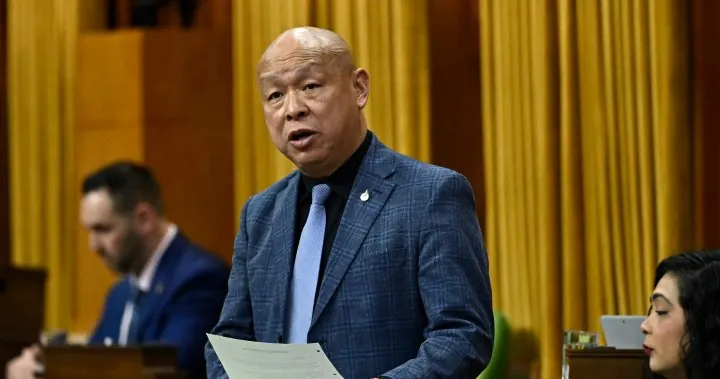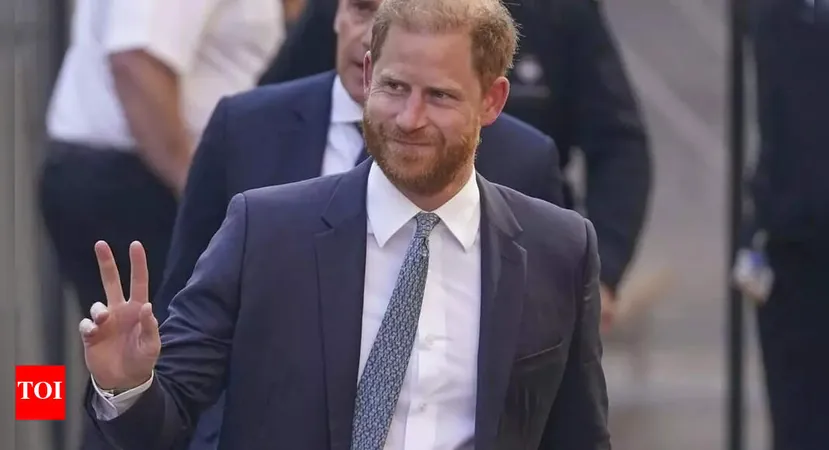
Liberal Candidate Paul Chiang Exits Election Following Controversial China Comments
2025-04-01
Author: Noah
In a significant political shakeup, Paul Chiang, the Liberal candidate for Markham-Unionville, has withdrawn from the federal election race amidst outrage over his controversial comments regarding a political opponent. Chiang suggested that Conservative candidate Joe Tay should be surrendered to Chinese authorities in exchange for a bounty, a statement that has drawn significant scrutiny and condemnation.
On Monday night, Chiang announced his decision to step aside via a post on the social media platform X (formerly Twitter). He expressed concern that his comments could distract from the vital work of the prime minister and Team Canada in standing up to U.S. President Donald Trump and safeguarding the Canadian economy.
The remarks were made during a press conference three months prior, where Chiang discussed Tay with representatives from the Chinese-language newspaper Ming Pao. Reports surfaced that during this event, he indicated that anyone who could bring Tay to Toronto’s Chinese consulate could claim a bounty of HK$1 million (approximately C$180,000). This has raised alarms about foreign interference in Canada’s political landscape.
The Royal Canadian Mounted Police (RCMP) responded to the growing public concern by confirming they are investigating the situation, emphasizing that they take any allegations of foreign influence or transnational repression seriously. An RCMP statement noted that foreign interference is a pervasive threat in Canada, and they are committed to investigating any illegal activities linked to foreign states.
In light of the backlash, Chiang issued a public apology on social media, describing his earlier remarks as 'deplorable' and acknowledging a lapse in judgment. He later reached out personally to Joe Tay to extend his apologies, which Tay later described as unsolicited and ultimately insufficient. In a statement, he condemned Chiang’s remarks as reflective of tactics employed by the Chinese Communist Party, stating that they threaten political opponents and should never be tolerated.
Liberal Leader Mark Carney, while labeling Chiang's comments as “offensive,” defended his candidate, calling him a person of integrity. Carney noted that Chiang has familial ties to Hong Kong, indicating that he understands the complexities of the situation there. However, Carney's decision to support Chiang has drawn criticism from opposition leaders, including Conservative Leader Pierre Poilievre and NDP Leader Jagmeet Singh. Poilievre accused Carney of failing to protect Canadian values, while Singh argued that by standing by Chiang, Carney was prioritizing party loyalty over national security.
The issue extends beyond personal statements, as it has ignited a wider conversation about foreign interference in Canada's elections and the safety of political dissidents. A public inquiry released earlier this year highlighted China’s active role in foreign interference, particularly targeting Canada's democratic institutions. Advocacy groups, including Hong Kong Watch, have called for thorough investigations into Chiang's comments, suggesting they not only intimidate political opponents but could also jeopardize lives.
Chiang’s exit from the race underscores the significant impact of international relations and foreign policy on Canadian politics, opening up questions about how the nation safeguards its democratic processes against external threats. As this story develops, the implications for both Chiang’s political career and the larger context of foreign interference in Canada’s elections will continue to unfold.









 Brasil (PT)
Brasil (PT)
 Canada (EN)
Canada (EN)
 Chile (ES)
Chile (ES)
 Česko (CS)
Česko (CS)
 대한민국 (KO)
대한민국 (KO)
 España (ES)
España (ES)
 France (FR)
France (FR)
 Hong Kong (EN)
Hong Kong (EN)
 Italia (IT)
Italia (IT)
 日本 (JA)
日本 (JA)
 Magyarország (HU)
Magyarország (HU)
 Norge (NO)
Norge (NO)
 Polska (PL)
Polska (PL)
 Schweiz (DE)
Schweiz (DE)
 Singapore (EN)
Singapore (EN)
 Sverige (SV)
Sverige (SV)
 Suomi (FI)
Suomi (FI)
 Türkiye (TR)
Türkiye (TR)
 الإمارات العربية المتحدة (AR)
الإمارات العربية المتحدة (AR)